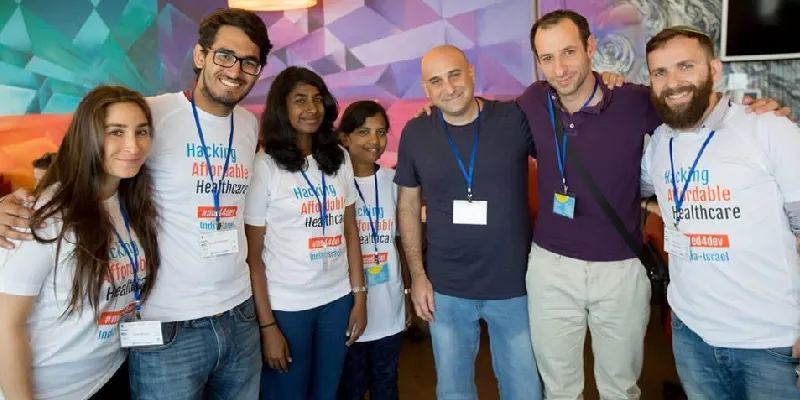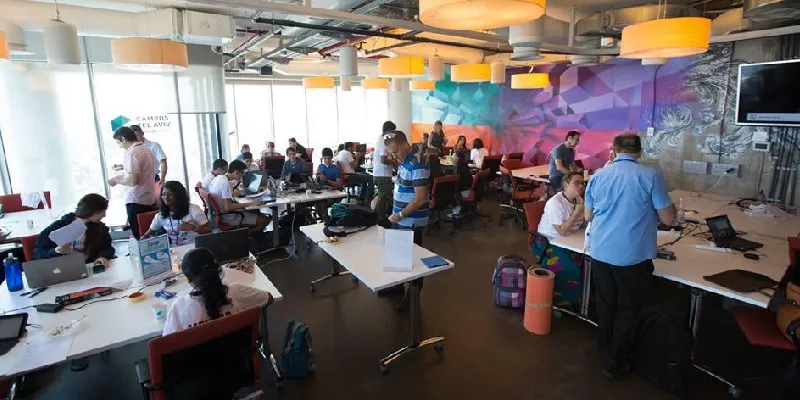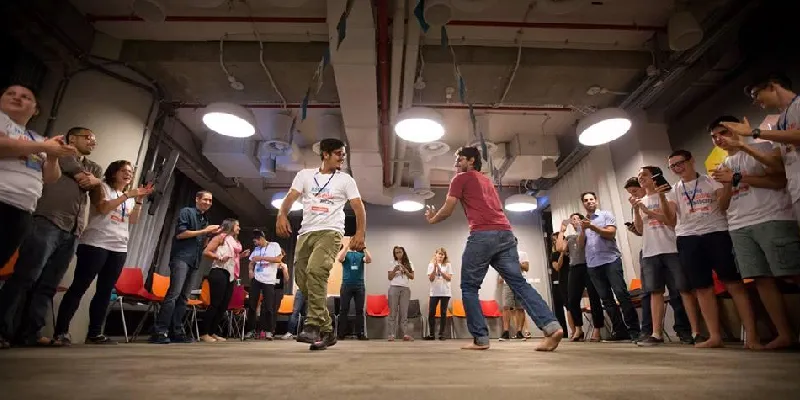When Startup India meets Startup Nation, it is a perfect tango
With the beginning of a new era of strategic partnership between India and Israel following the unprecedented visit of Prime Minister Narendra Modi to Israel, a big door of opportunities has opened for Indian startups. Let the music begin.

Key highlights
- Israel, India Innovation Initiative Fund of $40 million for tech innovation.
- Startup India Hub Innovation Challenge for early-stage startups in agriculture, water, and digital health (applications open in September).
- MoU between Indian Space Research Organisation (ISRO) and the Israel Space Agency (ISA) on cooperation in GEO-LEO Optical Link and electric propulsion for small satellites.
- Wipro to partner with Israel’s Tel Aviv University to conduct joint research in emerging technologies.
Last year, around this time, Hilly Hirt, Deputy Director of Israel’s Pears Program for Global Innovation, was in India scouting for talent.
She was on an ambitious mission to put Israel’s technical know-how to good use to solve India’s pressing need for affordable healthcare. Over three days across four locations—Tel Aviv, Bengaluru, Hyderabad, and Mumbai—she organised the India-Israel Med4Dev healthcare hackathon that brought together innovators from the two countries to develop prototype solutions (hardware and software) to address healthcare challenges of India’s poor.
She knows first-hand that the rewards of working together far outweigh the challenges of bringing the stakeholders of the two ecosystems together.
Having witnessed the run-up to the final hackathon, I can only hazard a guess at the frustration she must have experienced over delayed responses, poor infrastructure, and a general lack of disciplined approach. But if the event of the final day in Tel Aviv was any indication, breaking code, biryani, and Bollywood had more than made up for everything.
“India is a world leader in frugal innovation and the world’s most dynamic emerging market. It is ‘THE’ go-to-market and has invaluable knowledge regarding business models serving mass populations, B2C products, and scaling. Israel, on the other hand, is one of the most innovative countries in the world, with incredible tech ideas and knowledge about global markets. By joining forces the two nations can tackle not only India's market but some of the world’s most pressing innovation challenges,” she tells me from Tel Aviv about the synergies between the two startup ecosystems.
“We are swimming in the shallow end, while the Israelis are swimming in the deep end,”
Anand Madanagopal, Founder & CEO of Cardiac Design Labs, says, showing at once what needs to be done to grow the Indian startup space.
Never one to mince words, Anand, who has been quietly working on his product to bring innovative and advanced diagnostics to the masses at an affordable cost, says Indian tech entrepreneurs need to rub shoulders with the best in the world. “I want to compete with the Germans, the Japanese, and the Israelis. This will only help us,” he tells me.
One of Anand’s constant grouse has been the lack of tech product-based startups in India. “Israel is a mature ecosystem. India has a lot to gain from this formal association,” he adds, happy at the outcome of PM Modi’s just-concluded three-day visit to Israel.

Product-market fit
Narendra Modi’s unprecedented visit to the Jewish state has come as a shot in the arm for startups in India.
The two countries have announced a technology fund, the Israel, India Innovation Initiative Fund, to the tune of $40 million targetted at investments in the technology sector. They also agreed to boost bilateral trade from the current $5 billion to $20 billion in the next five years.
Hilly tells me that her organisation has been working on the Startup India Hub Innovation Challenge (applications for which open on September 10) that was launched yesterday (July 6) by the two Prime Ministers. The challenge, which is being implemented by Invest India and the Israel Innovation Authority, is targetting early-stage startups in agriculture, water, and digital health.
“At the end of the day, India is reluctant to take a risk in tech but can easily navigate a new market, while Israel has difficulty taking a risk in new emerging markets but can spot a disruptive technology a mile away. It’s only by overcoming both together that we can create something powerful and sustainable,” she adds.
Collaborative innovation
A recent report by Accenture and Nasscom estimates that by 2025, up to $25 billion of revenue potential can be unleashed for businesses in India and Israel through cumulative cross-border investment into the two countries’ startups.
The report titled, ‘Collaborative Innovation: The vehicle driving Indo-Israel prosperity’, states the unique innovation complementarities that the two countries share. It balances India’s large talent pool, its larger domestic market, inclusive innovation, servitisation, and jugaad to Israel’s technological capabilities, its industrial innovation, productisation, and of course, chutzpah.
The report goes on to suggest how the coming together of the two ecosystems can be a tour-de-force. “One-third of all American startups with billion-dollar valuations have an Indian or Israeli founder. This number is far greater than all such companies founded by entrepreneurs from the entire European continent,” says the Accenture and Nasscom report.
Elaborating this, Avnish Sabharwal, Managing Director, Accenture Ventures, India, says, “Israel considers the US as the number one market. Their corridor is very vibrant. Similarly, if you look at India and the US and the way Indians are involved in building companies in Silicon Valley, there is a lot of synergies. So, here we have one-third of the Silicon Valley startups founded by founders who are either Israelis or Indians, but the India-Israel corridor itself was missing.” The idea, according to Avnish, is to complete this triangle. “India and Israel are doing great work on innovation and can leverage whatever is happening in Silicon Valley that can help add a lot of momentum. A stronger collaboration between India and Israel will help create an innovation triangle among India, Israel, and the US,” he adds.

In 2016, Israeli startups closed 104 exit deals for a sum of $10 billion. Quoting IVC Research Center and law firm Meitar Liquornik Geva Leshem Tal, media reports said, this was up 12 percent from 2015.
In 2015, 150 Israeli companies were listed on Nasdaq (third largest next to China and the US), making it one of the most important startup ecosystems in the world.
Israel is third in the world for US-registered patents, and there are over 300 R&D centres of innovative tech companies like HP, Microsoft, Google, and Facebook in Israel. While we are at it, it will not harm us to know that Motorola developed the cell phone in Israel. That the Voicemail technology was developed in Israel. That the first antivirus software for computers was created in Israel in 1979. That AOL Instant Messaging was designed by an Israeli software company.
Diving into deep tech
Although for many years India and Israel’s relations rested mostly on defense deals, it is actually the fields of agriculture, water, healthcare, and fintech that present the widest opportunities. Add to that clean energy, new space, AI, and cyber security.
Commenting on the space deal signed between the two nations, Neha Satak, whose company Astrome Technologies is building Low Earth Orbit (LEO) satellites to deliver the internet from space, says, “For new space companies in India, this is a good step as it will improve access to Israeli satellite subsystems for us. It will open a path for Indian companies to sell its services/products to Israel or in collaboration with Israeli companies to the world. Commercial space technology is still in its early stages of development. Whoever invests in developing the core technology will become the market leader.”
Coinciding with Prime Minister Modi’s visit, the Indian Angel Network (IAN) has opened its Israeli operations in Tel Aviv. It plans to invest in early-stage startups in Israel and bring the tech to India, while Israeli investors joining the network will be investing in early-stage Indian startups. As Saurabh Srivastava, Chairman & Co-Founder of IAN, says, this gives an opportunity for India to make large companies.

Adding to the general consensus about Israel’s leadership in core tech, Saurabh says, “We (India) have an understanding and capability of how to apply this tech in our large market. We can create a context for that technology. It is a perfect match.”
Stating that he is bullish about this new partnership, Saurabh likens the Indo-Israel partnership to a game of tennis. “If you play with good players you will only get better.”







